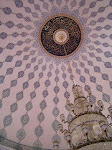'
'
It surprises you a little, it bores you a little: Ahmad Abdallah’s Heliopolis – هليوبوليس . His debut as director.
You get surprised as you expect something different when you think of Egyptian films. Instead it feels close to Western sensitivity, or better European. Ahmad Abdallah dares criticizing today’s Egypt, its political situation and he does it almost whispering. He shows you life in the absurd thirty years’ long “state of emergency”. He does it quietly, no desperate outcry, a modest budget and lots of nostalgia.
You get bored expecting until the end of the film that something might happen, that something might change. But no. Everything is languishing, everything is discouraging.
Khaled Aboul Naga, handsome celebrity in Egypt, is Ibrahim: Ain Shams University graduate documenting with his small digital video camera what remains of Heliopolis, an old district in Cairo that is losing (or has now lost) its peculiar cosmopolitan flavour. Distant in memory are the times in which Arabs shared their daily way of life with the British, the French, the Italian, the Belgian, the Greek and the Armenian communities, and those who saw all this fade away now regret it. Glorious and decadent buildings of the beginnings of last century are what is left to Ibrahim for filming and as only remnants of that past.
In the same place, during the same day, we witness the ordinary existences of few other characters of which each journey lightly touches that of the others. A couple looking for too modern a fridge for a flat they still have to find, a Coptic doctor about to emigrate to Canada, a three stars funduq employee who ran away from the poverty of her countryside village, a sentinel that we never see leaving, if not for a few steps, his sentry box. He is silent, his gaze into the void, listening to Fayrouz and eating chapati bread and fuul. He prays on a flattened carton serving as a sajjada (سجادة). He befriends a stray mutt and will have to leave it to its destiny. He’s the character I most loved. Night comes he has to jump on a military van, already packed with his brothers in arms, to reach the barracks.
A passive and resigned universe, a very Italian Egypt, we see. Nowadays Italy is very Egyptian.
You get surprised as you expect something different when you think of Egyptian films. Instead it feels close to Western sensitivity, or better European. Ahmad Abdallah dares criticizing today’s Egypt, its political situation and he does it almost whispering. He shows you life in the absurd thirty years’ long “state of emergency”. He does it quietly, no desperate outcry, a modest budget and lots of nostalgia.
You get bored expecting until the end of the film that something might happen, that something might change. But no. Everything is languishing, everything is discouraging.
Khaled Aboul Naga, handsome celebrity in Egypt, is Ibrahim: Ain Shams University graduate documenting with his small digital video camera what remains of Heliopolis, an old district in Cairo that is losing (or has now lost) its peculiar cosmopolitan flavour. Distant in memory are the times in which Arabs shared their daily way of life with the British, the French, the Italian, the Belgian, the Greek and the Armenian communities, and those who saw all this fade away now regret it. Glorious and decadent buildings of the beginnings of last century are what is left to Ibrahim for filming and as only remnants of that past.
In the same place, during the same day, we witness the ordinary existences of few other characters of which each journey lightly touches that of the others. A couple looking for too modern a fridge for a flat they still have to find, a Coptic doctor about to emigrate to Canada, a three stars funduq employee who ran away from the poverty of her countryside village, a sentinel that we never see leaving, if not for a few steps, his sentry box. He is silent, his gaze into the void, listening to Fayrouz and eating chapati bread and fuul. He prays on a flattened carton serving as a sajjada (سجادة). He befriends a stray mutt and will have to leave it to its destiny. He’s the character I most loved. Night comes he has to jump on a military van, already packed with his brothers in arms, to reach the barracks.
A passive and resigned universe, a very Italian Egypt, we see. Nowadays Italy is very Egyptian.
'
'
* * * * *
Un po' stupisce, un po' annoia questo Heliopolis - هليوبوليس di Ahmad Abdallah. Film di esordio.
Stupisce perché ti aspetti qualcosa di diverso quando pensi a un film egiziano. E invece ti ritrovi molto più vicino a una sensibilità occidentale, o ancor più a una europea. Ahmad Abdallah ha il coraggio di criticare l'Egitto di oggi, la situazione politica e di farlo in maniera quasi sussurrata. Ti mostra la vita di chi è costretto a fronteggiare quotidianamente le assurdità di uno "stato d'emergenza" che dura da oltre trent'anni. Lo fa pacatamente, senza alcun urlo disperato, con un budget modesto e tanta nostalgia.
Annoia perché ti aspetti fino alla fine del film che qualcosa accada, che qualcosa cambi. Invece no. Tutto stagna, tutto frustra.
Khaled Aboul Naga, belloccio e noto attore egiziano, interpreta Ibrahim: studente di Ain Shams che vuole documentare con la sua piccola cinepresa digitale quello che resta di Heliopolis, antico quartiere del Cairo che sta perdendo (o che ha ormai perso) il suo peculiare cosmopolitismo. Sono lontani i tempi in cui gli arabi convivevano con le comunità britanniche, francesi, italiane, belghe, greche ed armene e chi le ha viste dissolversi oggi le rimpiange. A Ibrahim non resta che filmare meravigliosi e decadenti edifici degli inizi del secolo scorso che soli sono rimasti a testimonianza di quel passato.
Nel medesimo luogo, durante la medesima giornata, assistiamo alle banali esistenze di pochi personaggi la cui storia lievemente sfiora quella degli altri. Una coppia di fidanzati alla ricerca di un frigorifero troppo moderno per un appartamento che ancora devono affittare, un medico copto in procinto di emigrare per il Canada, la receptionist di un tre stelle scappata dalla miseria del suo villaggio di origine, un poliziotto coscritto che non vediamo mai allontanarsi, se non di qualche passo, dalla sua garitta. E' silenzioso, lo sguardo perso nel vuoto, ascolta Fayrouz mangiando pane rotondo e foul. Prega su uno scatolone, sventrato e sgualcito, aperto, a mo' di sajjada (سجادة) e fa amicizia con un bastardino randagio che dovrà abbandonare al suo destino. E' il personaggio che ho adorato di più. Fattasi sera è costretto a salire su un furgone, già zeppo di colleghi, per raggiungere la caserma.
Un universo passivo e rassegnato al suo destino quindi, un Egitto molto italiano. Un'Italia molto egiziana quella di oggi.
'










No comments:
Post a Comment